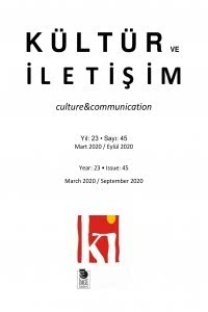Bir Varoluş Sorunsalı: Persona
Bu makale, İsveçli yönetmen lngmar Bergman'ın Persona filmine odaklanmaktadır. Persona, hem biçimsel, hem de tematik yapıdaki farklılıkları nedeniyle (geleneksel - ticari sinemadan farklı olarak) bir "sanat filmi" niteliğindedir. izleyiciye izlediğinin yalnızca bir film olduğu duyumsatılır. Film, karakterlerin psikolojik, felsefi anlamda "varoluş"u sorgulamaları nedeniyle derin anlamlar içerir. Bu nedenle de film, çoğul okumaya uygun "açık bir yapıt"tır. Persona'daki "varoluş", kadınların erkek egemen toplumda kendilerine biçilen toplumsal rollere, personalara ve bunların reddine ilişkin bir "varoluş" niteliğindedir. Bu makalenin amacı ise, bu çoğul okumaları göz önünde bulundurarak Persona'yı, Lacancı psikanalizin verileri ışığında incelemektedir. Persona'ya Lacancı psikanalitik yaklaşım, film karakterlerinin, "ben"in kuruluşu sürecinde gereksinim duyduğu "öteki" olan gerilimli ilişkilerini görmeyi olanaklı kılar.
Anahtar Kelimeler:
varoluş ve sinema, imge ve sinema, persona, Bergman
A Problem of Existence: Persona
This essay is focused on his feature film Persona of Ingmar Bergman, the Swedish director. Persona, is an art film, not a conventional-commercial one, because it differs in the formal and thematic structure. it makes the spectacle feel as what he watches is only a film. But due to the interrogate of the "existance" of the characters in the film in a psychological and philosophic way, the film has deep meanings. Therefore the film is an "open work" available for multi-interpretation. The existence in the film, is the one that women challenges the roles and personas in the patriarchal society. The aim of this essay is to analyze Persona in the light of Lacanian psychoanalysis by taking these multi-interpretations into consideration. The Lacanian psychoanalytical approach to Persona, makes possible to see that the construction of the identity needs ta "other''.
___
- Barr, Allan P. (1987). "The Unraveling of Character in Bergman's Persona" Film Quarterly 15 (12): 123-136.
- Barton, Brad (2003). "Bergman& Kafka." http://magazine.1-4850.com/9403/film.html.
- Bergman, Ingmar (1959). "Each Film is My Last." Films And Filming (July): 8-29.
- Bergman, Ingmar (1967). Aynadaki Gibi/Sessizlik. Çev. Fadıl Taylan. İstanbul: Bilgi.
- Bergman, Ingmar (1990). Büyülü Fener. Çev. Gökçin Taşkın. İstanbul: Afa.
- Bergman, Ingmar (1999). İmgeler. Çev. Gökçin Taşkın. İstanbul: Nisan.
- Blackwell, Marilyn Johns (1997). Gender and Representation in the Films of Ingmar Bergman. Colombia: Camden House.
- Boyd, David (1983/84). "Persona and the Cinema of Interpretation." Film Quarterly Winter 37 (2): 10-19,
- ISSN: 1301-7241
- Yayın Aralığı: Yılda 2 Sayı
- Başlangıç: 1998
- Yayıncı: İmge Kitabevi Yayınları
